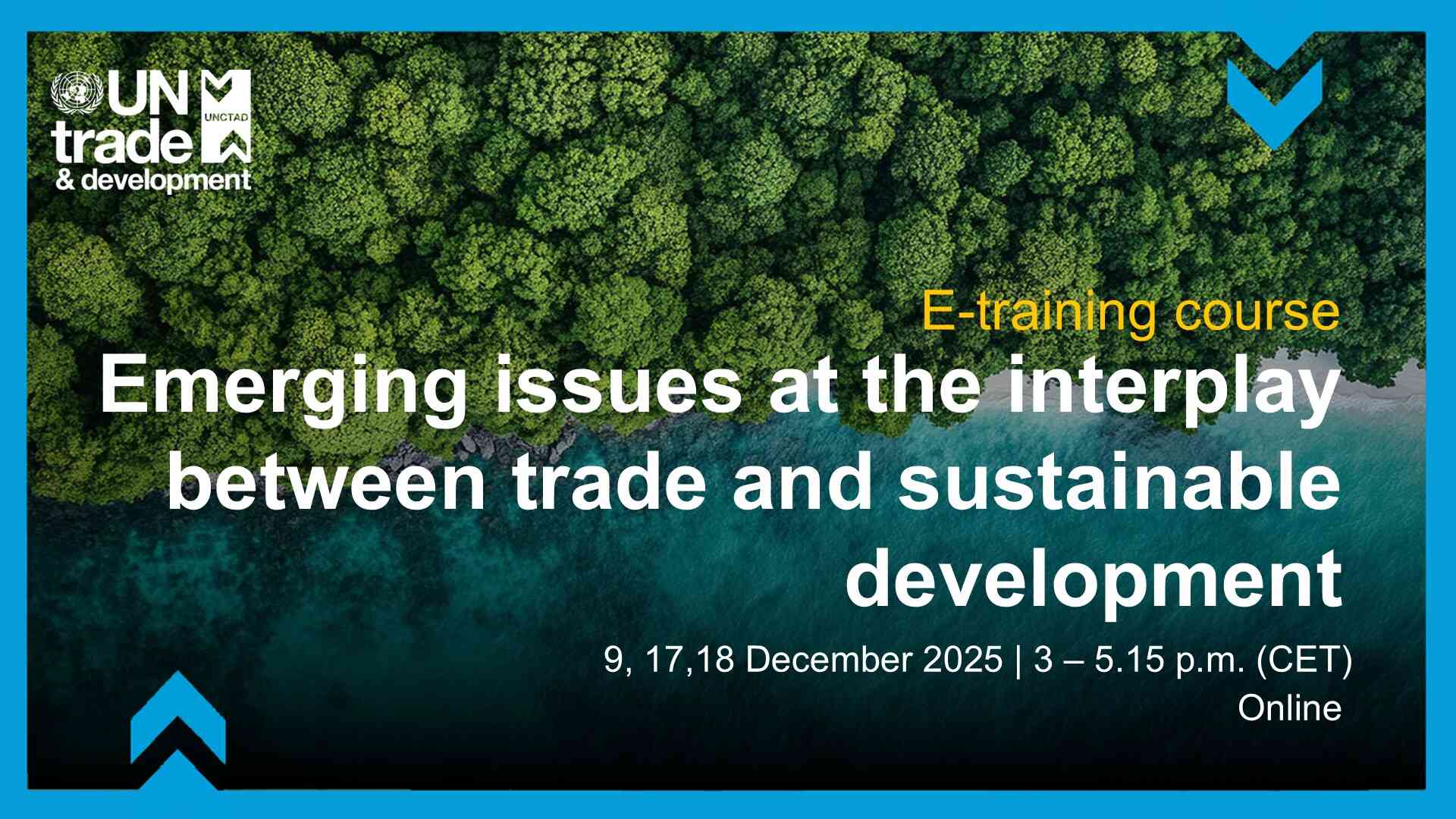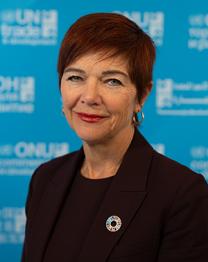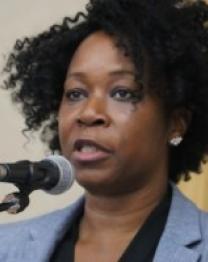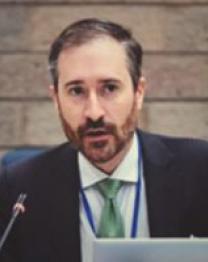
songpol152©AdobeStock
Background
The interplay between international trade and the environmental and social dimensions of sustainable development has surged as a critical domain of analysis and governance within the multilateral trading system. Policymakers, institutions and stakeholders concerned with market access, competitiveness, and the regulation of trade in goods and services increasingly recognize that trade policy has both positive and negative direct and profound implications for environmental and social outcomes. The multilateral trading system continues to serve as a cornerstone in shaping the legal and institutional frameworks that govern international commerce, thereby exerting significant influence on advancing the Sustainable Development Goals.
Today, there are more than 250 multilateral environmental agreements (MEAs) in force globally. These agreements impose substantive obligations that affect both the modalities and volumes of international production and trade. These MEAS increasingly embedded sustainability-related criteria, including technical standards, safety requirements, and measures to safeguard human health and the environment. Simultaneously, market dynamics are being reshaped by the growing demand f or sustainable goods and services, expressed not only by individual consumers but also through public procurement frameworks and private-sector initiatives across both advanced and developing economies.
We are facing a "triple planetary crisis" of climate change, biodiversity loss, and pollution. This crisis is compounded by heightened uncertainty stemming from shifting geopolitical dynamics, economic volatility, trade tensions, and disruptions. The transboundary and systemic nature of these challenges underscores a central reality: the pursuit of sustainable development and environmental integrity cannot be achieved unilaterally. Instead, such issues possess intrinsic global significance and require coordinated multilateral responses to be addressed effectively.
In this context, aligning trade and environmental policy to capture socio-economic benefits is indispensable. Coordinated multilateral trade and economic policies are crucial for advancing the 2030 Agenda for Sustainable Development, particularly Goals 12 on sustainable consumption and production, 13 on climate action, and 14 on life below water. Furthermore, these policies are instrumental in reinforcing the implementation of major international legal instruments, including the Paris Agreement, the WTO Fisheries Subsidies Agreement (WTO FSA), and the United Nations Agreement on Marine Biodiversity Beyond National Jurisdiction (BBNJ Agreement. Collectively, these frameworks reinforce the imperative of integrating environmental considerations into trade regulation and practice, ensuring that international trade in sustainable goods and services contributes to both ecological sustainability and equitable human well-being.
Objective
This online training seeks to provide participants with a better understanding of how recent and emerging multilateral trade and environment agreements, negotiations, and initiatives interact in response to the triple environmental crises, including contemporary and emerging challenges and opportunities, and their implications for market access and sustainable development, with a focus on developing countries. More precisely, this year, the e-training will focus on:
- Climate change and trade policy: Using trade and trade policy to advance national climate plans, including Nationally Determined Contributions (NDCs) and climate action while maximizing GHG reduction effects and minimizing negative spillovers, particularly in developing countries.
- Filling the gaps in a sustainable ocean economic governance: the content and implementation of the WTO fisheries subsidies & selected trade and shipping aspects of United Nations BBNJ Agreements.
- Retake of plastic treaty negotiations (INC process), Basel, Rotterdam and Stockholm (BRS) Conventions and regional processes: scaling up circularity in plastics, non-plastic substitutes, including in special sectors such as fishing gear, agriculture and textiles.
Methodology and duration
The online training will consist of 2:15 hour sessions delivered over 3 days. Through expert-led discussions and interactive exchanges, participants will strengthen their capacity to integrate environmental considerations into trade policy, foster low-carbon, sustainable, and circular value chains that yield socio-economic benefits, and navigate the ratification and implementation of new multilateral agreements, thereby enhancing their ability to integrate environmental considerations into their trade policy.
Audience
This course is targeted at policymakers, trade negotiators, officials from capital, and academics involved in international trade and sustainable development. Registration is mandatory to attend this online training, and a certificate of participation will be awarded to those who attend at least two of the 2-hour sessions.
Modalities
A unique zoom registration and link will be used for all sessions. Registration link to be added.
Tentative agenda
9 December 2025, 3–5:15 p.m. (CET), Session 1: Climate Change, trade policy: advancing NDCs and climate action
17 December, 3–5:15 p.m. (CET), Session 2: Emerging ocean economic sectors and related governance
18 December, 3–5:15 p.m. (CET), Session 3: Plastic treaty negotiations and BRS Conventions processes and scaling up circularity in plastics
Online event evaluation
Guiding questions
9 December 2025, 3–5:15 p.m. (CET), Session 1: Climate Change, trade policy: advancing NDCs and climate action
- What were the main trade-related outcomes of UNFCCC COP 30 in Belem, Brazil?
- How can trade measures be designed to support climate goals, such as NDC implementation, while minimizing negative spill-over effects on developing countries?
- What strategies can promote green and blue value chains and foster low-carbon development across sectors and regions?
- In what ways can trade-related measures, investment and sustainable finance tools contribute to climate action and enable climate-resilient trade, particularly for MSMEs?
17 December, 3–5:15 p.m. (CET), Session 2: Emerging ocean economic sectors and related governance
- How can the WTO Agreement on Fisheries Subsidies and related international initiatives (e.g. WTO Fish Fund, UNCTAD, FAO, OECD) assist in tackling Illegal Unreported and Unregulated (IUU) fishing, overfishing, and overcapacity, while enabling the sustainable development of the fisheries sector, including small-scale fisheries?
- How can assessment, data and analytical tools be used by countries to implement the WTO Subsidies Agreement, develop national ocean and fisheries trade profiles, and identify opportunities for sustainable fisheries management?
- What are the main objectives, obligations, and implementation challenges of the UN Agreement on Marine Biodiversity Beyond National Jurisdiction (BBNJ)? What is the state of play in the BBNJ Preparatory Commission and how BBNJ’s entry into force might shape global ocean governance?
- How will the BBNJ Agreement impact trade-related aspects such as access and benefit-sharing of marine genetic resources, and maritime supply chains?
18 December, 3–5:15 p.m. (CET), Session 3: Plastic treaty negotiations and BRS Conventions processes and scaling up circularity in plastics
- How can plastic trade be leveraged to improve alignment with the BRS Conventions and ensure the appropriate management of chemicals of concern within the International Negotiations Committee (INC) process?
- What trade and economic opportunities—such as recycling markets or innovation incentives—could emerge from stronger global controls on plastic waste and hazardous additives?
- Which circular and bio-based substitutes show the greatest potential in agriculture, fisheries, and packaging, and what barriers hinder their wider adoption?
- How can policies, markets, and investment accelerate the shift from synthetic materials to sustainable fibre or bio-based substitutes while ensuring full life-cycle sustainability?

Dr. Carpentier, from Quebec, Canada, is Head of Trade, Environment, Climate change, and Sustainable Development Branch of UNCTAD’s Division on International Trade and Commodities (DTIC). Her work with governments and partners foster green, blue, circular, and impact economies that supported by trade, are key to addressing the triple planetary crisis: climate change, pollution and biodiversity loss. She came to Geneva after leading the UNCTAD New York office, representing the SG and coordinating UNCTAD’s support to inter-governmental negotiations of the UN General Assembly (2015-2023).
She held several other positions. At the UN Department of Economic and Social Affairs, she facilitated the engagement of NGOs, women and youth’s groups, business, local authorities, etc. in the SDGs negotiations and the UN Rio+20 Conference (2011-2015). She also supported the Commission on Sustainable Development research and negotiations on sustainable agriculture and sustainable consumption and production (2007-2011).
Prior to joining the UN, she Headed the North American Free Trade Agreement Commission for Environmental Cooperation’s, Environment, Economy and Trade Division (2000-2007), was Agro-environmental policy analyst for Winrock International (1998-2000) and post-Doctoral fellow/Brazil office manager for the International Food Policy Research Institute (1996-1998).
She has a PhD. in Agro-Environmental Economics from Virginia Tech, as well as a MSc. and BSc. in Agro- Economics from McGill University and is an ironman and ultramarathoner. She is a Yale World Fellow, received the 2023 Schwab Foundation for Social Entrepreneurship public intrapreneur award, and is a UNEP Who’s Who of Women and the Environment.

Malick Kane has over ten years of experience coordinating projects and conducting research in the areas of green exports, climate change, and Non-Tariff Measures (NTMs). He has contributed to various publications on trade and climate change and is currently leading the implementation of regional projects aimed at promoting intra-African value chain development, low-carbon economic diversification, and climate resilience. In addition to his project management and research work, he is actively involved in developing and delivering both face-to-face and online training programs.
Malick joined UNCTAD in 2012 and is currently a member of UNCTAD’s Trade and Environment Branch. He also works closely with UNCTAD’s Trade Analysis Branch to which he belonged for over three years. Before joining UNCTAD, he worked at UNITAR on environmental governance, green economy, and climate change.
He holds a Diploma of Advanced Studies in Management and Analysis of Public Policies from the University of Geneva, Switzerland, and is also a graduate in Public Law and Political Science from the University of Toulouse, France.

Dr. Claudia Contreras joined UNCTAD in 2013.
Since 2020, she is an Economic Affairs Officer at the Trade, Environment and Sustainable Development Branch. Her work is focused on the interlinkages between climate change, environment, and trade and development.
Formerly, Claudia was a member of the Secretariat of the United Nations Commission on Science and Technology for Development (CSTD), and worked for the Chilean government on science, technology, and innovation policy.
Claudia holds a BSc in Economics from the University of Chile and graduated with an MSc in Management Research and a PhD in Development Studies from the University of Oxford.
Christian Knebel is an Economic Affairs Officer at United Nations Conference for Trade and Development. He manages technical cooperation projects and provides advisory services on trade policy and negotiation strategy.
He leads UNCTAD’s support programme to the African Union on the implementation of the AfCFTA Non-Tariff Barriers mechanism. Specializing on research regarding non-tariff measures and regulatory cooperation, he has drafted reports on the AfCFTA, ECOWAS, SADC, ASEAN and MERCOSUR.
He was a visiting lecturer at the World Trade Institute. Previously, he worked at the International Trade Centre where he conducted and analyzed private sector surveys on obstacles to trade in various countries.
He studied International Economics at the University of Tübingen, Germany, and in Buenos Aires, Argentina.

Regina Asariotis is Chief (a.i.) of the Trade Logistics Branch in the Division on Technology and Logistics of UNCTAD with responsibility for UNCTAD’s related work, including coordination of the UNCTAD Review of Maritime Transport 2025. She is also Chief of the Policy and Legislation Section, with responsibility for UNCTAD's work on transport law and policy.
Before joining UNCTAD in 2001, Regina was a Senior Lecturer in Maritime Law at the University of Southampton and a member of the Governing Board of the Institute of Maritime Law, an internationally leading centre for research and teaching in the field.
She holds a German law degree (Bavaria), an English LL.M (Soton) and a German doctorate in Maritime Law (Dr. jur., Hamburg) and is a practising Barrister (England & Wales), an Attorney at Law (Greece), as well as Member of the Chartered Institute of Arbitrators (CIArb).
Lorenzo Formenti is a consultant helping policymakers and businesses tackle sustainability challenges in supply chains.
An economist by training, he has worked on enterprise-focused sustainability and trade initiatives in more than 10 countries with organizations such as UN Trade and Development (UNCTAD) and the Organisation for Economic Co-operation and Development (OECD). At the International Trade Centre (ITC), he conducts economic research to support the sustainability transition and the internationalization of small businesses.
He recently led the development of a policy guide on integrating small and medium-sized enterprises (SMEs) into national climate plans. Previously, he managed Mondi Group’s supplier sustainability program, promoting responsible sourcing in the packaging sector. Lorenzo holds a master’s degree in Economics from the University of Pavia.

Dr. Amelia U. Santos-Paulino is Chief of the Investment Issues at UNCTAD’s Division on Investment and Enterprise.
Previously, she was a Senior Economist at UNCTAD’s Africa, Least Developed Countries and Special Programmes Division. Before joining UNCTAD, she was Research Fellow and Project Director in the United Nations University’s World Institute for Development Economics Research (UNU-WIDER) in Helsinki, Professorial Research Fellow in the University of Sussex’s Institute of Development Studies, and Senior Research Economist in the Central Bank of the Dominican Republic.
She served as Senior Adviser of the Dominican Republic’s Government on International Trade and Investment for the negotiations of the US-DR-CAFTA Free Trade Agreement, amongst other full-time posts within the civil service and academia of the Dominican Republic. She has also held visiting posts at the University of California, Davis, the Graduate Institute of International and Development Studies in Geneva, Fudan University in Shanghai, and the Asian Development Bank Institute in Tokyo.
Her work has been published in journals including the Economic Journal, Cambridge Journal of Economics, and World Development, and has also edited books published by Oxford University Press and Cambridge University Press.
She holds PhD and MA degrees in Economics from the University of Kent in the UK.

Dr. Manal Shehabi is an applied development economist with recognized expertise in the economics-energy-climate nexus and policies in resource developing economies. She is Senior Research Fellow at Oxford’s Institute for New Economic Thinking at the Oxford Martin School, Seminar Leader for Economics at Blavatnik School of Government, the University of Oxford. She is Member of the Institute for Energy, Climate, and Disaster Solutions at the Australian National University; Research Fellow (elected) of the Economic Research Forum; and Founding Director of SHEER Research & Advisory. She is a consultant to the International Energy Agency and an expert of the UNFCCC on just energy transitions, response measures, and economic diversification.
Her interdisciplinary work offers important contributions to the understanding and modeling of diversification, just transitions, fiscal space, people in vulnerable situations, energy and climate policy alternatives in developing countries and petrostates.
Her research has global impact on debates for solutions for energy, climate, and economic challenges. She addressed by invitation the 1st High-Level Ministerial Roundtable on Just Transition at COP28 to help ministers and delegates with the Just Transition Work Programme (JTWP) (operationalized at COP28). She addressed by invitation the 1st JTWP Dialogue at the SB60 2024 Bonn Climate Conference along with the Chair of the IPCC. Her economic models are used for policymaking and she reviewed and advised on hydrogen and green industrial policies.
She was also lead author of various policy briefs/reports (T7 (G7), T20 (G20), UNFCCC, UNICEF). She co-authored, among others, the IPCC Special Report on the Ocean, Kuwait Energy Outlook 2020, a UNFCCC report on modeling impacts of response measures in developing countries (presented at COP26), and a roadmap on cement decarbonization in Saudi Arabia. She advised PWYP and the Open Society Foundation on just energy transition in the MENA region. She is an Advisory Board Member for the EFI-KAPSARC energy transitions research project and the Natural Resources Governance Institute MENA platform. She taught undergraduate and graduate university courses and conducted capacity building for policymakers in developing countries in four continents.
Having lived in four continents, she gained professional experiences in public policy and industry working on projects spanning six continents. She regularly advises policy makers, firms, and international institutions. She is cited and appears in media in different languages.
Dr. Shehabi received various honors, grants, and awards. A polyglot, she is fluent in English, Arabic, French, proficient in Spanish, and speak intermediate Mandarin Chinese and basic Italian and Hebrew.

David Vivas Eugui is Chief of Ocean and Circular Economy Unit, a.i., Trade, Environment, Climate Change and Sustainable Development Branch, at UNCTAD.
Previously, he was a Senior Economic Affairs Officer in UNCTAD’s Trade Negotiations and Commercial Diplomacy Branch, Deputy Programmes Director at the International Centre for Trade and Sustainable Development (ICTSD), Senior Attorney at the Center for International Environmental Law (CIEL), Attaché for Legal Affairs at the Mission of Venezuela to the World Trade Organization (WTO) and Staff Attorney at the Venezuelan Institute of Foreign Trade. David is an international expert with more than 20 years of experience on legal and economic issues.
He has worked as an advisor and consultant for various institutions, international and national organizations and has lectured on intellectual property, trade, oceans economy and environmental law at the University of Strasbourg (CEIPI), Universidad de Buenos Aires (Argentina), Universidad Javeriana (Colombia), Maastricht University (the Netherlands), WIPO Distant Learning Academy, and University of Business and International Studies (Switzerland).
He holds a JD from the Universidad Catolica Andres Bello, an LLM from Georgetown University and a Master in Transnational Business from the Universidad Externado de Colombia.

Ludovic Arnaud is an Associate Economic Affairs Officer in the Trade, Environment, Climate Change and Sustainable Development Branch of UNCTAD, focusing on ocean economic data and analysis. He previously worked on supporting UNCTAD in its development of databases on trade in ocean goods and services and trade in biodiversity-based products, as well as on the organisation of the informal Working Group on trade and biodiversity statistics and the 5th UN Ocean Forum.
He holds a PhD in International Development from the University of Oxford, focused on the renegotiation of the North American Free Trade Agreement (NAFTA), and a Master’s from the University of Cambridge.
His research has been published in New Political Economy, World Politics Review, and Oxford Analytica. His upcoming book, ‘Hostile Trade Renegotiation: The Paradox of USMCA’ will be published with Georgetown University Press.
Lorena is a policy analyst at the fisheries and aquaculture unit of the Organisation for Economic Co-operation and Development (OECD). Main areas of work include subsidies and government support measures to the fisheries sector, and government policies to tackle Illegal, Unreported and Unregulated Fishing.
Before joining the OECD, Lorena worked for the Colombian Ministry of Trade, and served as delegate to the World Trade Organisation, where she took part in the Fisheries Subsidies Agreement, adopted in June 2022.

Charlotte Salpin is a Senior Legal Officer at the Division for Ocean Affairs and the Law of the Sea, Office of Legal Affairs of the United Nations, where she has worked for 20 years.
She currently heads the cluster providing the interim secretariat for the BBNJ Agreement and also dealing with the protection and preservation of the marine environment, marine scientific research and sustainable development issues. A former Senior Legal Officer at the International Seabed Authority, she started her UN career at the Law Division of the United Nations Environment Programme. Charlotte has followed the BBNJ process since its inception in 2004 and currently serves as the Secretary of the Preparatory Commission to prepare for the entry into force of the Agreement.
Charlotte holds an advanced postgraduate university degree in public international law from Paris University (Panthéon-Assas) and an LLM in environmental law from London University (School of Oriental and African Studies).
Henrique Pacini is an economist at the United Nations in Geneva, where he works on trade and circular economy issues. He has a degree in economics from the University of São Paulo, a Masters in European Studies from Hochschule Bremen, Germany, and a Ph.D in Energy Technology from KTH, Sweden.
He recently completed a post-doctoral fellowship at Harvard University, where he examined the commercial dynamics of secondary/scrap materials in world trade, and co-chaired Harvard’s first Circular Economy Symposium. Dr. Pacini published over 60 articles on environment, energy, trade and development issues.

Dr Ebenezer Laryea is a Reader (Professor) in Law at Aston University and Project Director for the Fresh Produce Impact Hub (FRESHPPACT), a research and development hub delivering practical solutions to plastic pollution within Ghana’s fresh-produce manufacturing and supply chains.
He also leads the LeatherTrace Bangladesh project, a pioneering initiative developing and piloting a digital e-traceability system which aims help Bangladesh’s tannery sector meet international environmental and social compliance standards across global value chains.
Ebenezer's research centres on Sustainability and Sustainable Development Law - spanning areas such as plastics, traceability, human rights, climate justice, social impact, net zero, and decarbonisation - where he has produced several research and knowledge exchange outputs.
His most recent work is a researched national policy report that sets out a practical blueprint for Ghana’s transition from conventional plastic products to plastic alternatives and non-plastic substitutes, advancing sustainable industrial practice and trade in sustainable alternatives.
Emma Algotsson is the founder and project lead of Catchgreen, a South African startup and collaborative research initiative tackling marine sustainability. Under her leadership, Catchgreen has pioneered the development of specialized marine compounds and executed successful fishing net trials—including pilot programs in Kenya focused on seaweed farming and gear exchange. These innovations directly address critical challenges such as abandoned, lost, or discarded fishing gear (ALDFG), ghost fishing, and ocean plastic pollution.
With over eight years of experience in the trade and manufacturing of biodegradable and compostable plastics, Emma is also the founder of the South African Compostable Plastics Council (COPCO). COPCO advocates for the compostable plastics industry, promoting alignment with international certification standards and driving sustainable product innovation.
Emma holds an M.Phil from the University of Cambridge and a CPE in Law from City, University of London. Her work is driven by a deep commitment to creating solutions that serve both the planet and its people.
Argyro Kepesidi serves as an Associate Legal Officer in the Policy and Legislation Section of the Trade Logistics Branch of UNCTAD, carrying out research on legal and regulatory developments affecting transport and global supply chains. Before joining UNCTAD, she worked as a private consultant in Belgium and in Greece, at the European Commission and as a lawyer.
Argyro has concluded her PhD at the University of Athens specialising in aspects of comparative, maritime and energy law, as well as Law of the Sea and holds a Greek law degree and two LLMs in Commercial Law and Oil and Gas Law from the University of Athens and the University of Aberdeen respectively. She is a Member of the Piraeus Bar Association.
Julia is an oceanographer and a global expert in ocean plastic pollution.
She has a PhD in plastic waste, studied plastic recycling, and was one of the earliest members of The Ocean Cleanup, a Dutch not-for-profit developing technology to remove plastic from the seas.
Heidi has worked in the textile manufacturing industry since 1988, many years of which have been in new product development. In recent years, she has trained in all areas of expertise and application in the textile industry, from academia, textile manufacturers, retail and clothing to non-profit organisations and community groups.
Heidi consults on technical aspects of textiles and is involved with several international environmental projects as a textile technical advisor with the UK-based Sustainable Manufacturing Environmental Pollution Prevention Programme (or “SMEP”).
Heidi is on the board of directors of a waste beneficiation NPO called Use-It and the Durban Textile and Leather Incubator. She is chairperson of the South African Dyers’ and Finishers’ Association.

Dr Atiq Zaman is an internationally renowned expert in circular economy and zero waste practices, and the Founding Co-Director of the Global South Nexus (GSN).
He holds several prominent research leadership roles, including: Circular Economy Engagement Coordinator for the Sustainable Manufacturing and Environmental Pollution (SMEP) Programme at UN Trade and Development (UNCTAD) in Geneva, Switzerland (May–September 2025), Member of the UN Council of Engineers for the Energy Transition (CEET) (2022–2026), Curtin Node Manager of the Sustainable Communities and Waste Hub, funded by the Department of Climate Change, Energy, the Environment and Water (DCCEEW) under the National Environmental Science Programme Phase 2 (NESP2) (2021–2027), Circular Economy Research Theme Leader at the Sustainable Built Environment National Research Centre (SBEnrc) (2024–ongoing), Circular Economy Research Leader at the Curtin Institute for Energy Transition (2023–ongoing).
Dr Zaman has published around 80 peer-reviewed outputs, including authored and edited books, journal articles, and industry, technical, and policy reports. His contributions have earned him the title of the world's top zero-waste expert according to ScholarGPS and a place in the world’s top 2% of scientists by Stanford/Elsevier. His forthcoming co-edited book titled “Circular Economy: Theories, Metrics, and Global Practices” is scheduled for publication with Routledge in 2026.
Helena is an international environmental lawyer and policy expert working at FAO's Environment team, where she focuses on plastics and bioeconomy.
She previously worked at UNEP in Nairobi, supporting the Intergovernmental Negotiating Committee (INC) on plastic pollution. Prior to that, she worked in FAO's Development Law Service, providing legal assistance on forestry, biodiversity, and sustainable agrifood systems.
Passionate about global environmental governance, Helena is dedicated to fostering policy dialogue on plastic pollution and sustainability

Andrea Cararo is a Programme Management Officer in the Science and Technical Assistance Branch of the Basel, Rotterdam and Stockholm Conventions Secretariat. He delivers technical assistance on preventing, reducing and managing plastic waste, and supports national, regional and global projects that help Parties in implementing the Basel Convention Plastic Waste Amendments.
He previously held positions at ITU, UNITAR and UNEP, where he led e-waste policy support, advanced Pollutant Release and Transfer Registers, and managed capacity-building initiatives on persistent organic pollutants and e-waste.
He holds a Master’s degree in European Economy and Business Law from the University of Rome Tor Vergata.

Ms. Olayinka Bandele, PhD is a development economist with over 20 years experience of working on trade policy, industrialization, private sector development, export diversification, regional value chains, SME trade and the intersectionality of trade and gender. Her current research interests focus on SME innovation and dynamic capabilities impact on trade competitiveness.
Dr Bandele is the Chief of the Inclusive Industrialization Section in the United Economic Commission for Africa (UNECA) Sub-regional Office for Southern Africa, based in Lusaka. She took up this position in September 2021.
Prior to her position at UNECA, Dr Bandele was a Trade Adviser at the Commonwealth Secretariat, London and held an acting position as Head of Section with the Trade Competitiveness Section at the Commonwealth Secretariat. She also covered gender and economic empowerment as a Programme Officer at the start of her career at the Commonwealth in 2010.
She also held posts as a senior economist and Manager of the Private Sector Development practice at Nathan EME Inc., consultancy based in London and a former Overseas Development Institute (ODI) fellow/adviser in the Namibia Ministry of Trade and Industry, funded by the UK Department for International Development.
Ms. Bandele, holds a PhD in Management and an MSc in International Business from Birkbeck College, University of London, an MSc in Development Economics from the School of Oriental and African Studies (SOAS), University of London, and a Bachelors degree in Economics from Sussex University, UK.
Bruno Antunes works on economic affairs at the United Nations Trade and Development (UNCTAD), and previously at the United Nations Economic Commission for Latin America and the Caribbean (ECLAC).
Applies policy analyses and delivers technical assistance and capacity building on trade in services to promote sustainable and inclusive economic development. Focuses on the role of services in diversification and structural transformation.
James Boyd-Moss is a mechanical engineer and entrepreneur focused on developing circular-economy solutions in agriculture.
He founded Mananasi Fibre Ltd, a company that converts pineapple leaf waste into natural fibre for sustainable textiles and animal feed in the form of silage.
Through several years of engineering development and field work, he has helped demonstrate how agricultural residues can be turned into valuable raw materials while reducing waste and supporting rural livelihoods. James’s work combines practical engineering with an interest in resource efficiency and local enterprise, contributing to a more sustainable and inclusive bio-economy.

Mr. Frédéric Perron-Welch is an international lawyer with 15 years of experience advising international organizations, governments, the private sector, and civil society on international environmental law and sustainable development.
He currently serves as a Trade and Environment Policy Expert at the African Trade Policy Centre (ATPC) of the UN Economic Commission for Africa (ECA) where his work focuses on green and blue value chains and low-carbon development in the African Continental Free Trade Area (AfCFTA).
Brian Sagala is a Communications and Sustainability Consultant currently supporting Yajayo Limited in establishing its plastic recycling plant and implementing circular economy programs. He brings over 15 years of experience in strategic communications, with five years dedicated to the waste management and recycling sector.
Brian previously served as Head of Marketing & Communications at TakaTaka Solutions, one of Kenya’s largest plastic recyclers, where he led community engagement with waste pickers, policy advocacy, and compliance initiatives.
His work spans stakeholder engagement, ESG communication, and behavioural change campaigns, positioning him as a key voice in advancing sustainable waste management in East Africa.

Dr Manuel Brunner leads the Sustainable Materials Innovation & Investments program at Minderoo Foundation.
With a PhD in chemistry and expertise in sustainable materials and technology commercialization, Manuel accelerates the transition away from problematic plastics.
His work supports breakthrough innovation through targeted research grants and scales promising solutions by investing in start-ups via Minderoo’s $250M Strategic Impact Fund, advancing materials that are better for human and planetary health.
Petra Kynclova is a Statistician at the UNCTAD Statistics, Data and Digital Service, where she contributes to various projects with particular interest in measuring inclusiveness and sustainability of global trade.
Before joining UNCTAD, she worked at the UNIDO Statistics Division, where she played a key role in developing the global monitoring indicator framework for SDG-9, emphasizing sustainable and inclusive industrialization.
She holds a PhD in Technical Mathematics from the Vienna University of Technology in Austria.
Khusrav Rasulov (Rav) is a Fisheries Subsidies Officer in the WTO Rules Division.
Prior to that, he served as Legal/Economic Affairs Officer in the WTO Accessions Division and worked on the WTO accession negotiations of Azerbaijan Belarus, Bhutan, Turkmenistan, and Uzbekistan.
Rav holds a bachelor's degree in International Relations and a master's degree in Economics from the Saint‑Petersburg State University, Russia, and an LLM in International Economic Law and Policy from the University of Barcelona, Spain.
Rishi Sharma is a Senior Fisheries Officer at FAO’s Fisheries and Aquaculture Division, where he leads work on sustainable fisheries management, including the ABNJ and EAF Nansen projects, and serve as lead developer of FAO’s global stock status metric and SDG 14.4 on sustainable fisheries.
Previously, he held senior scientific roles with NOAA Fisheries and the Indian Ocean Tuna Commission, leading stock assessments and management strategy evaluations for tuna and other marine species across multiple ocean basins.
His career spans international fisheries science, ecosystem-based management, and capacity building.

















